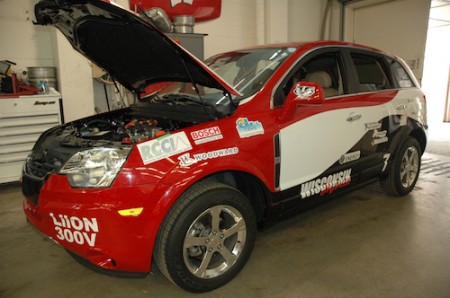Over the past 20 years, the University of Wisconsin Hybrid Vehicle Team has dominated the U.S. Department of Energy’s Advanced Vehicle Competition by winning the event six times.
Now the group is taking a hiatus to work with the university’s Engine Research Center in hopes of perfecting a new mixed-fuel technology that harnesses the advantages of both diesel and gasoline fuels.

The group, led by mechanical engineering Professor Rolf Reitz, is working on a technology known as reactivity controlled compression ignition (RCCI).
This process involves two separate fuel injections – gasoline and diesel, or as they’re doing at Wisconsin, ethanol and biodiesel – which allows combustion to take place at lower temperatures.
This is a more complete form of combustion that offers a number of benefits, including allowing the engine to run more efficiently and reducing greenhouse gas emissions.
Team leaders estimate that the RCCI engines will emit 75 percent less harmful emissions. Once the technology is fine-tuned, the engines will be installed in two of the university’s hybridcompetition models. Both models are slated to be operational by 2013.
The team hopes that its work on emerging engine technology will encourage auto industry leaders to latch on to the concept.
In addition, applications for stationary power generators could bring even more benefits.
However, RCCI engines could face a looming infrastructure challenge: In order to fuel an RCCI engine, a gas station pump must be able to dispense both gasoline and diesel, or ethanol and biodiesel, simultaneously.






